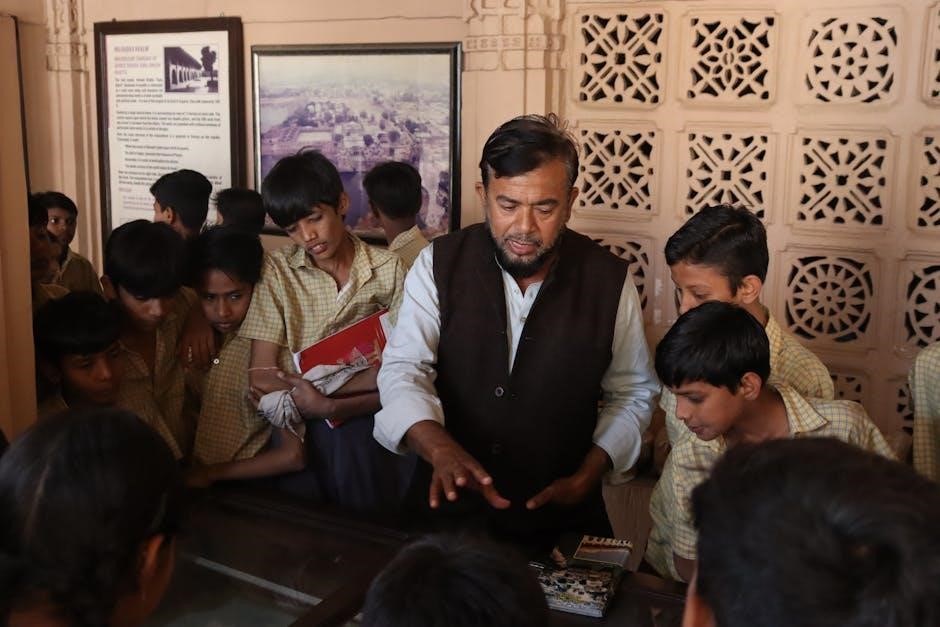Learning Arabic in India is a rewarding journey, with abundant resources like PDF guides, online courses, and cultural immersion opportunities. This comprehensive guide offers tailored strategies, tips, and resources to help Indian learners master Arabic effectively, exploring its cultural significance and practical applications in a structured and accessible manner.
Why Learn Arabic?
Learning Arabic opens doors to understanding a rich cultural heritage and accessing Islamic texts, history, and literature. It enhances academic and career opportunities in fields like diplomacy, linguistics, and international business. Arabic’s global significance and its role in connecting with diverse communities make it a valuable skill. Additionally, mastering Arabic boosts cognitive abilities and broadens cultural perspectives.
Overview of Arabic Language and Its Importance
Arabic is a Semitic language with a rich history, serving as the liturgical language of Islam and an official language in 25 countries. Its unique script, written right-to-left, consists of 28 letters. Arabic’s influence extends to languages like Urdu and Hindi, making it culturally significant in India. It unlocks access to Islamic texts, historical manuscripts, and diverse literary works, enriching academic and cultural understanding for learners.

Benefits of Learning Arabic for Indian Learners
Learning Arabic enhances cultural understanding, unlocks Islamic texts, boosts career prospects in diplomacy and academia, and fosters connections with Arabic-speaking communities globally and within India.
Cultural and Historical Significance
Arabic holds deep cultural and historical significance in India, influencing languages like Urdu and shaping Islamic education. Its script is used in Indian languages, and scholars like Al-Biruni bridged cultural gaps. Learning Arabic connects learners to India’s rich Islamic heritage, fostering understanding of shared history and religious texts, while enriching cultural exchange and appreciation.
Academic and Career Opportunities
Learning Arabic in India opens doors to diverse academic and career opportunities. It enhances prospects in fields like diplomacy, international business, and Islamic studies. Scholars and professionals can access Middle Eastern markets and universities, while also excelling in translation and research roles, making Arabic a valuable skill for career advancement and global engagement.

Resources for Learning Arabic in India
India offers diverse resources for learning Arabic, including PDF guides, online courses, and textbooks, providing accessible tools for mastering the language effectively.
Best PDF Guides and Textbooks
Popular PDF guides like “Learn Arabic in 30 Days” and textbooks such as “Teach Yourself Arabic” offer structured lessons for Indian learners. These resources cover the Arabic alphabet, basic grammar, and vocabulary, providing a comprehensive foundation. Additionally, textbooks like “Cambridge IGCSE Arabic” cater to advanced learners, ensuring a smooth progression from beginner to proficient levels with practical exercises and cultural insights.
Online Courses and Platforms
Online platforms like Udemy, Coursera, and specialized Arabic learning websites offer diverse courses tailored for Indian learners. Courses such as “Yallah Emirati Arabic” and “Arabic for Beginners” provide interactive lessons, cultural insights, and flexible pacing. These platforms cater to all skill levels, ensuring learners can progress at their own pace with structured learning paths and progress tracking tools, making Arabic accessible without the need for physical classes.
Free Online Resources and Apps
Indian learners can benefit from free online resources like Duolingo, Babbel, and Memrise for basic Arabic skills. Apps such as “Learn Arabic ─ Udemy” and “Arabic Language Course” offer interactive lessons. Websites like Arabicpod101 and YouTube channels provide free tutorials, flashcards, and quizzes. These tools cater to diverse learning styles, making Arabic accessible and engaging for learners at all levels, with a focus on practical, everyday language skills and cultural insights.
Top Institutions Offering Arabic Courses in India
Prestigious universities like Jamia Millia Islamia in Delhi and Aligarh Muslim University offer renowned Arabic programs. These institutions provide comprehensive courses, blending language skills with cultural insights.
Renowned Universities and Colleges
India is home to prestigious institutions offering Arabic courses, such as Jamia Millia Islamia in Delhi and Aligarh Muslim University. These universities provide comprehensive programs in Arabic language, literature, and culture. They emphasize both modern and classical Arabic, equipping students with advanced language skills and deep cultural insights. These institutions are recognized for their rigorous academic standards and esteemed faculty, making them top choices for learners.
Madrasas and Religious Institutions
Madrasas in India play a vital role in teaching Arabic, focusing on religious texts like the Qur’an and Hadith. These institutions emphasize classical Arabic grammar and literature, blending language learning with cultural and religious studies. Many madrasas offer structured courses, providing learners with a strong foundation in Arabic, particularly for understanding Islamic theology and heritage, making them valuable centers for religious and linguistic education.
Understanding the Arabic Language Structure
Arabic’s unique script and grammar form its core. The language uses a right-to-left script with 28 letters, focusing on consonants, vowels, and diacritics. Its structure emphasizes patterns and roots, making it systematic yet challenging for learners. Mastering these fundamentals is essential for proficiency, as outlined in guides like “Learn Arabic in 30 Days” and other resources tailored for Indian learners.
Arabic Alphabet and Writing System
The Arabic alphabet consists of 28 letters, written from right to left. Each letter changes shape based on its position in a word. Diacritics indicate vowel sounds, essential for pronunciation. Indian learners can benefit from guides like “Learn Arabic in 30 Days” and “A Practical Guide to Learning Moroccan Darija,” which introduce the alphabet and writing system step-by-step, aiding in mastering the fundamentals of Arabic script and reading skills effectively.
Basic Grammar and Vocabulary
Mastering basic Arabic grammar involves understanding verb conjugations, tenses, and sentence structure. Essential vocabulary includes common phrases, greetings, and numbers. Resources like “Learn Arabic in 30 Days” and “A Practical Guide to Learning Moroccan Darija” provide structured lessons. Focus on recognizing patterns and practicing pronunciation to build a strong foundation. These elements are crucial for effective communication and further language progression, tailored for Indian learners aiming to grasp Arabic fundamentals efficiently.

Cultural Immersion and Practice Opportunities
Cultural immersion is vital for mastering Arabic. Engage with Arabic-speaking communities in India, attend cultural events, and participate in language exchange programs to enhance fluency and understanding.
Engaging with Arabic-Speaking Communities
Engaging with Arabic-speaking communities in India enhances language learning by providing real-life interaction. Attend cultural events, join local Arabic clubs, and participate in language exchange programs to practice speaking and listening skills. This fosters cultural understanding and helps learners adapt to diverse Arabic dialects, making the learning process more immersive and effective in both urban and rural settings.
Language Exchange Programs
Language exchange programs offer a dynamic way to practice Arabic with native speakers while teaching them Indian languages. These programs, often available online or through local communities, foster linguistic and cultural exchange. They enhance fluency, provide real-life context, and deepen understanding of dialects like Modern Standard Arabic or Levantine Arabic, making learning immersive and mutually beneficial for all participants involved.

Effective Strategies for Self-Study
Utilize Arabic learning apps, schedule regular practice, and leverage PDF guides for structured lessons. Consistency, goal-setting, and immersive exercises with media enhance self-study success.
Setting Goals and Creating a Study Plan
Begin by setting clear, achievable goals, such as mastering the Arabic alphabet or basic vocabulary. Create a structured study plan with daily targets, leveraging PDF guides and apps. Allocate time for grammar, reading, and speaking. Stay motivated by tracking progress and celebrating milestones. Consistency and regular practice are key to steady improvement in your Arabic learning journey.
Using Language Apps and Digital Tools
Leverage modern technology by utilizing language apps like Duolingo, Babbel, and Rosetta Stone for interactive Arabic lessons. Digital tools offer flexible learning, with features such as pronunciation practice, flashcards, and quizzes. Additionally, PDF guides and online courses provide comprehensive resources to supplement your study plan, ensuring a well-rounded approach to mastering Arabic effectively and efficiently.

Assessment and Progress Tracking
Regularly use tests and quizzes from PDF guides and online platforms to evaluate your Arabic skills. Track progress through self-assessment tools and seek feedback to refine your learning strategy effectively.
Tests and Quizzes for Self-Evaluation
Utilize tests and quizzes from PDF guides and online platforms to assess your Arabic proficiency. These tools offer multiple-choice questions, fill-in-the-blank exercises, and translation tasks to evaluate reading, writing, and comprehension skills. Regular self-evaluation helps track progress, identify weaknesses, and refine your learning strategy. Many resources, such as Learn Arabic Through Pdf and Teach Yourself Arabic, include interactive quizzes for practical self-assessment.
Seeking Feedback from Teachers or Tutors
Engaging with qualified teachers or tutors is crucial for refining your Arabic skills. They provide personalized feedback, correct pronunciation, and clarify doubts, ensuring accurate learning. Regular interactions help improve comprehension, grammar, and vocabulary. Tutors can also recommend tailored resources, such as specific PDF guides or exercises, to address weaknesses and enhance progress. Their expertise accelerates your learning journey and builds confidence in using Arabic effectively.

Motivation and Overcoming Learning Challenges
Staying motivated requires setting goals and celebrating progress. Engage with apps, community support, and consistent practice to overcome challenges and maintain enthusiasm for learning Arabic.
Staying Motivated Throughout the Journey
Maintaining motivation is crucial for consistent progress in learning Arabic. Set realistic goals, celebrate milestones, and immerse yourself in cultural activities. Engage with Arabic-speaking communities, use language apps, and practice regularly. Surrounding yourself with supportive peers and tracking progress can also boost enthusiasm and keep you driven throughout your learning journey.
Tips to Overcome Common Difficulties
Common challenges in learning Arabic include mastering its script and complex grammar. Break these into manageable parts, focusing on one aspect at a time. Use language apps for interactive practice, seek feedback from teachers, and engage in regular conversations. Embrace mistakes as part of the learning process and stay consistent in your efforts to build confidence and fluency gradually.

Advanced Learning and Specialization
Mastering Arabic dialects and classical texts enhances language proficiency. Explore advanced grammar, literary works, and cultural nuances to deepen understanding and specialization in the Arabic language.
Mastering Dialects and Advanced Grammar
Mastering Arabic dialects and advanced grammar is essential for proficient communication. Resources like “Teach Yourself Arabic” and specialized PDF guides provide structured lessons to explore dialects such as Moroccan Darija and Gulf Arabic. These materials also delve into complex grammatical structures, enabling learners to grasp the nuances of both spoken and written Arabic effectively in India.
Exploring Arabic Literature and Media
Exploring Arabic literature and media enriches language learning by exposing learners to authentic texts, films, and music. Indian learners can access works like Ibn Battuta’s travelogues and modern Arabic literature through PDF guides and online resources. This immersion helps build a deeper understanding of cultural contexts and enhances comprehension, making learning Arabic in India both enjoyable and enriching.
Mastering Arabic in India is a transformative journey, blending cultural richness and practical skills. With comprehensive PDF guides and online resources, learners can confidently embrace this rewarding language and its profound significance in India’s diverse cultural landscape.
Summarizing the Learning Journey
The journey to learn Arabic in India is a comprehensive and enriching experience, supported by tailored resources like PDF guides, online courses, and cultural immersion opportunities. From mastering the Arabic alphabet to understanding advanced grammar, learners can progress steadily with structured guidance. These resources not only enhance language skills but also provide cultural insights, fostering a deeper appreciation for Arabic’s significance in India’s diverse linguistic landscape.
Encouragement for Future Learners
Embark on the rewarding journey of learning Arabic in India with confidence! Utilize the wealth of resources, including PDF guides, online courses, and cultural activities, designed to make your learning experience engaging and accessible. Embrace the challenges and celebrate the milestones, knowing that mastering Arabic opens doors to new career opportunities, cultural insights, and a deeper connection to India’s diverse heritage. Start your journey today and unlock the rewards of this beautiful language!

Recommended Books and Materials
Explore top-rated books like “Teach Yourself Arabic” and “Learn Arabic in 30 Days” for structured learning. These resources provide practical skills and cultural insights, ideal for Indian learners seeking comprehensive guidance.
Top-Rated Textbooks and Guides
Indian learners can benefit from textbooks like “Teach Yourself Arabic” and “Learn Arabic in 30 Days,” designed for structured learning. These guides offer practical lessons, covering the Arabic alphabet, grammar, and vocabulary. They provide cultural insights and are tailored for those aiming to understand Arabic script and basic communication. These resources are ideal for self-study and complement online courses, ensuring a comprehensive learning experience.
Additional Resources for Advanced Learners
Advanced learners can explore specialized resources like the Cambridge IGCSE Arabic Workbook and Teachers Book, focusing on dialects and advanced grammar. Literary works and Arabic media, such as classical texts and modern films, offer deeper cultural insights. These materials, often available as PDF guides, provide comprehensive learning tools for mastering complex language skills and understanding nuanced cultural contexts effectively.
Final Tips for Success
Consistency is key; practice daily and utilize all available resources, including PDF guides and online tools, to master Arabic effectively and achieve your learning goals.
Consistency and Practice
Consistency is essential for mastering Arabic. Set aside time daily to practice reading, writing, and speaking. Use PDF guides and language apps to reinforce learning. Focus on understanding the Arabic alphabet, basic grammar, and vocabulary. Immerse yourself in the language by listening to Arabic media and engaging in conversations with native speakers or language partners for practical application.
Utilizing All Available Resources
Leverage diverse resources to enhance your Arabic learning journey. Utilize PDF guides like “Learn Arabic in 30 Days” and textbooks such as “Teach Yourself Arabic.” Enroll in online courses and use language apps like Duolingo for interactive lessons. Engage with Arabic-speaking communities through cultural events and language exchange programs to gain practical experience and deepen your understanding of the language.

Call to Action
Download the comprehensive India Learning Arabic Guide PDF now and embark on your journey to master the Arabic language with tailored resources and expert strategies.
Download the Comprehensive Guide Now
Access the India Learning Arabic Guide PDF for free, featuring a detailed roadmap to mastering Arabic. This comprehensive resource includes lessons on the alphabet, grammar, vocabulary, and cultural insights, tailored specifically for Indian learners; With practical exercises and expert tips, it’s your ultimate tool to begin or advance your Arabic learning journey. Download now and start exploring the richness of the Arabic language today!
Start Your Arabic Learning Journey Today
Begin your Arabic learning adventure with our curated resources and expert guidance. The India Learning Arabic Guide PDF offers a structured approach, starting from the basics of the alphabet to advanced grammar and vocabulary. Engage with cultural insights and practical exercises designed for Indian learners. Download the PDF now and take the first step toward fluency in Arabic, unlocking new opportunities and enriching your linguistic journey.